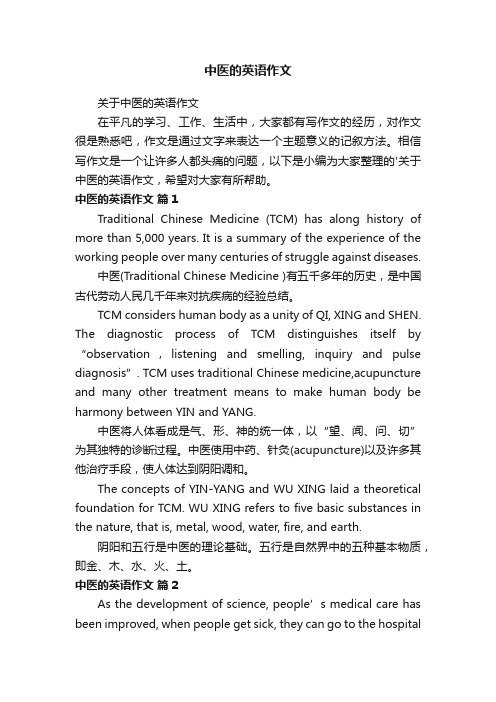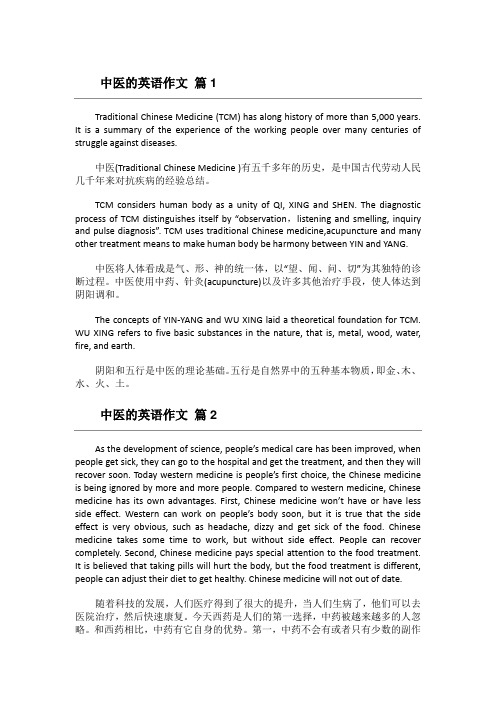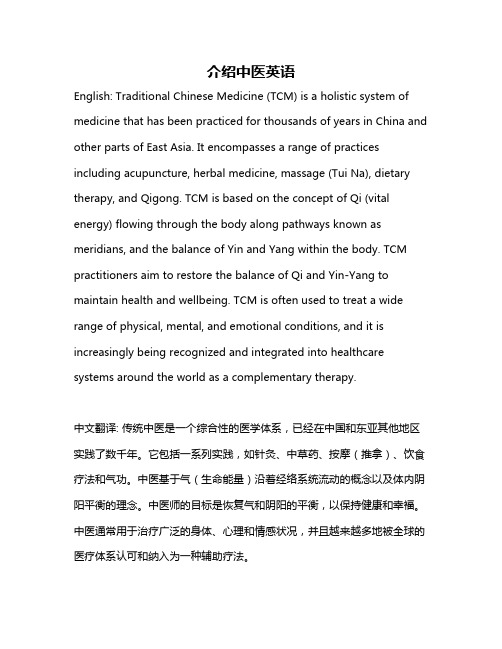中医英语介绍
中医英语复试自我介绍模板

中医英语复试自我介绍模板英文回答:esteemed professors and fellow applicants,。
I am honored to have the opportunity to introduce myself as I seek admission to the prestigious Master's program in Traditional Chinese Medicine at your esteemed institution.My passion for Traditional Chinese Medicine (TCM) was ignited during my undergraduate studies in Chinese language and culture. I was fascinated by the holistic approach to health and well-being that TCM offers, and I was eager to delve deeper into its principles and practices.Inspired by the ancient wisdom and profound healing power of TCM, I spent the past two years studying under a renowned master practitioner. During this time, I gained a solid foundation in the core concepts of TCM, including thetheory of yin and yang, the five elements, and the channels and collaterals. I also mastered various TCM techniques, such as acupuncture, herbal medicine, and tuina massage.Through my clinical practice, I have witnessedfirsthand the transformative effects of TCM in addressing a wide range of health conditions. I have successfully treated patients with chronic pain, digestive disorders, allergies, and emotional imbalances. The ability to help people regain their health and well-being has been an incredibly rewarding and fulfilling experience.My research interests lie in the integration of TCM with Western medicine. I believe that by combining the strengths of both systems, we can provide patients with the most effective and holistic care possible. I amparticularly interested in exploring the use of TCM for the treatment of chronic diseases and mental health conditions.I am confident that I possess the knowledge, skills, and passion necessary to succeed in your rigorous program.I am also an enthusiastic learner who is always eager toexpand my knowledge and understanding of TCM. I am committed to upholding the highest ethical standards and to providing compassionate and effective care to my patients.I believe that my unique blend of academic background, clinical experience, and research interests make me anideal candidate for your program. I am confident that I can make a meaningful contribution to the field of TCM, and I am eager to learn from the renowned faculty and experienced practitioners at your institution.Thank you for your time and consideration. I look forward to the opportunity to further discuss my qualifications and aspirations with you.中文回答:各位尊敬的教授、亲爱的同学:我怀着崇敬的心情,向大家介绍我自己。
中医的英语作文

中医的英语作文关于中医的英语作文在平凡的学习、工作、生活中,大家都有写作文的经历,对作文很是熟悉吧,作文是通过文字来表达一个主题意义的记叙方法。
相信写作文是一个让许多人都头痛的问题,以下是小编为大家整理的'关于中医的英语作文,希望对大家有所帮助。
中医的英语作文篇1Traditional Chinese Medicine (TCM) has along history of more than 5,000 years. It is a summary of the experience of the working people over many centuries of struggle against diseases.中医(Traditional Chinese Medicine )有五千多年的历史,是中国古代劳动人民几千年来对抗疾病的经验总结。
TCM considers human body as a unity of QI, XING and SHEN. The diagnostic process of TCM distinguishes itself by “observation,listening and smelling, inquiry and pulse diagnosis”. TCM uses traditional Chinese medicine,acupuncture and many other treatment means to make human body be harmony between YIN and YANG.中医将人体看成是气、形、神的统一体,以“望、闻、问、切”为其独特的诊断过程。
中医使用中药、针灸(acupuncture)以及许多其他治疗手段,使人体达到阴阳调和。
The concepts of YIN-YANG and WU XING laid a theoretical foundation for TCM. WU XING refers to five basic substances in the nature, that is, metal, wood, water, fire, and earth.阴阳和五行是中医的理论基础。
介绍中医的英语作文200字

介绍中医的英语作文200字英文回答:Traditional Chinese Medicine (TCM) is a comprehensive and ancient medical system that has been practiced in China for thousands of years. It is based on the idea that the human body is a microcosm of the universe, and that health and disease are caused by an imbalance of yin and yang, the two opposing forces that govern all things.TCM practitioners use a variety of techniques to diagnose and treat illness, including acupuncture, herbal medicine, massage, and dietary therapy. They believe that the body has the ability to heal itself, and that the role of the practitioner is to support and guide this process.TCM is a holistic system of medicine that takes into account the whole person, not just the symptoms of their illness. It is a safe and effective way to treat a wide range of conditions, and it can be used in conjunction withWestern medicine.中文回答:中医是中国传统医学,是中国古代一门以阴阳五行学说、脏腑经络学说为基础,研究人体生理、病理、诊断、治疗预防等方面的医学科学。
有关中医的英语作文

中医的英语作文篇1Traditional Chinese Medicine (TCM) has along history of more than 5,000 years. It is a summary of the experience of the working people over many centuries of struggle against diseases.中医(Traditional Chinese Medicine )有五千多年的历史,是中国古代劳动人民几千年来对抗疾病的经验总结。
TCM considers human body as a unity of QI, XING and SHEN. The diagnostic process of TCM distinguishes itself by “observation,listening and smelling, inquiry and pulse diagnosis”. TCM uses traditional Chinese medicine,acupuncture and many other treatment means to make human body be harmony between YIN and YANG.中医将人体看成是气、形、神的统一体,以“望、闻、问、切”为其独特的诊断过程。
中医使用中药、针灸(acupuncture)以及许多其他治疗手段,使人体达到阴阳调和。
The concepts of YIN-YANG and WU XING laid a theoretical foundation for TCM. WU XING refers to five basic substances in the nature, that is, metal, wood, water, fire, and earth.阴阳和五行是中医的理论基础。
介绍中医的英语作文带翻译

介绍中医的英语作文带翻译Traditional Chinese Medicine (TCM) has a history of thousands of years and is an important part of Chinese culture. It includes various forms of herbal medicine, acupuncture, massage (tui na), exercise (qigong), and dietary therapy.中医有着数千年的历史,是中国文化的重要组成部分。
它包括各种形式的草药治疗、针灸、按摩(推拿)、运动(气功)和饮食疗法。
TCM is based on the concept of balance between yin and yang, as well as the idea that the body's vital energy (qi) flows along meridians. When the flow of qi is disrupted, illness occurs. TCM aims to restore the balance and flow of qi to promote healing.中医基于阴阳平衡的概念,以及人体的精气(气)沿着经络流动的观念。
当气的流动受到干扰时,疾病就会发生。
中医旨在恢复气的平衡和流动,促进康复。
One of the most well-known practices of TCM is acupuncture, which involves inserting thin needles into specific points on the body to stimulate the flow of qi. This can help with pain relief, stress reduction, and overall wellness.中医最著名的实践之一是针灸,它涉及在身体特定穴位插入细针以刺激气的流动。
介绍中医英语

介绍中医英语English: Traditional Chinese Medicine (TCM) is a holistic system of medicine that has been practiced for thousands of years in China and other parts of East Asia. It encompasses a range of practices including acupuncture, herbal medicine, massage (Tui Na), dietary therapy, and Qigong. TCM is based on the concept of Qi (vital energy) flowing through the body along pathways known as meridians, and the balance of Yin and Yang within the body. TCM practitioners aim to restore the balance of Qi and Yin-Yang to maintain health and wellbeing. TCM is often used to treat a wide range of physical, mental, and emotional conditions, and it is increasingly being recognized and integrated into healthcare systems around the world as a complementary therapy.中文翻译: 传统中医是一个综合性的医学体系,已经在中国和东亚其他地区实践了数千年。
它包括一系列实践,如针灸、中草药、按摩(推拿)、饮食疗法和气功。
中医方面3分钟英语演讲

中医方面3分钟英语演讲Traditional Chinese medicine (TCM) was born in the primitive society. TCM carries the experience and theoretical knowledge of the ancient people in China in fighting diseases. It is a medical theoretical system gradually formed and developed through long-term medical practice under the guidance of ancient simple materialism and spontaneous dialectics.Based on the theory of Yin-Yang and Five Elements in traditional Chinese medicine, the human body is regarded as the unity of qi, form and spirit. Through the method of "seeing, smelling, asking and feeling", the cause, nature and location of the disease are explored, the pathogenesis and the changes of internal organs, meridian joints, qi, blood and body fluid in the human body are analyzed, the rise and fall of evil is judged, then the name of the disease is obtained, the syndrome types are summarized, and the principle of syndrome differentiation and treatment is formulated.中医诞生于原始社会,中医承载着中国古代人民同疾病作斗争的经验和理论知识,是在古代朴素的唯物论和自发的辩证法思想指导下,通过长期医疗实践逐步形成并发展成的医学理论体系。
以中医为主题的英语作文

以中医为主题的英语作文Traditional Chinese Medicine (TCM) has a long history and profound cultural significance in China. 中医有着悠久的历史和深厚的文化底蕴。
Its principles and practices have been passed down from generation to generation, shaping the way many Chinese people view health and wellness. 它的原理和实践被一代一代传承,塑造了许多中国人对健康和福祉的看法。
One of the key concepts in TCM is the idea of balance within the body. 中医的一个关键概念是体内的平衡。
According to TCM theory, health is achieved when the body's qi, or vital energy, is flowing smoothly and harmoniously. 根据中医理论,当身体的气,或者生命力,能够流畅和和谐地流动时,健康就得以实现。
In TCM, the idea of yin and yang plays a significant role in understanding the body's balance. 在中医中,阴阳的概念在理解体内平衡方面起着重要作用。
Yin represents qualities such as calmness, darkness, and cold, while yang represents qualities like activity, light, and heat. 阴代表着平静、黑暗和寒冷等特质,而阳代表着活动、光明和热度等特质。
- 1、下载文档前请自行甄别文档内容的完整性,平台不提供额外的编辑、内容补充、找答案等附加服务。
- 2、"仅部分预览"的文档,不可在线预览部分如存在完整性等问题,可反馈申请退款(可完整预览的文档不适用该条件!)。
- 3、如文档侵犯您的权益,请联系客服反馈,我们会尽快为您处理(人工客服工作时间:9:00-18:30)。
中医英语介绍Revised on November 25, 2020About Basic Theories of TCM(中医基础理论的主要内容)1.The basic theories of TCM deal primarily with basic theoretical knowledge such as physiology, pathology, and the treatment and prevention of disease.中医基础理论主要阐述人体的生理、病理及疾病的防治等基本理论知识。
includes yin and yang, the five elements, visceral manifestations, qi, blood, body fluid, vitality, meridians, etiology, pathogenesis, and principles of disease prevention and treatment.内容包括阴阳、五行、藏象、气血津液精神、经络、病因与发病、病机、防治原则等。
Yin-Yang and Five Elements(阴阳五行)fall in the category of ancient Chinese philosophy with concept of materialism and dialectics. 阴阳五行本属中国古代哲学范畴,具有唯物主义和辩证法思想。
and five elements were introduced in TCM to elucidate the structure, physiology and pathology of the body, and guide the clinical diagnosis and treatment.中医运用阴阳学说来阐释人体的结构、生理和病理,并用以指导临床的诊断和治疗。
Explanation Of Five Elements Doctrine in TCM(五行)1. Five elements are indispensable material in human life inter-promotion and inter-restriction.五要素是人类生活中不可缺少的物质,相互促进、相互制约。
2. in TCM—they can explain physiological and pathological changes in human body.在中医概念中,它们可以解释人体的生理和病理变化。
Explanation Of Yin-Yang Theory in TCM(阴阳学说)structure of the body (Zang-viscera and fu-viscera)体部结构(脏腑、腑)of disease—a relative imbalance between Yin and Yang (Yin syndrome or Yang syndrome)treatment of Yin and Yang to restore its relative balance.阴阳相对失衡的疾病诊断(阴证、阳证)治疗疾病,调节阴阳恢复相对平衡Visceral Manifestation Theory(藏象学说)1. This theory deals with the physiological functions, and pathological changes of the viscera, tissues and organs as well as their interrelationship.研究人体各脏腑、组织器官的生理功能、病理变化及其相互关系。
2. It also deal with the mutual relations between the viscera, tissues, organs and the external environment. 以及脏腑、组织器官与外界环境相互关系的学说。
is an important part of TCM’s theoretical system and serves as the theoretical basis for clinical diagnosis and treatment.是中医学理论体系的重要组成部分,也是指导临床各科进行辨证论治的理论基础。
Qi, Blood, Body Fluid and Vitality(气血津液精神)deal primarily with the generation and actions of qi, blood, body fluid and vitality as well as their interrelationship. 主要阐述气、血、津液、精神的生成、作用及其相互关系tells us that they are not only the products of zang-viscera and fu-viscera activity, but also the material basis on which both the zang-viscera and the fu-viscera function.说明气、血、津液和精既是脏腑功能活动的产物,又是脏腑功能活动的物质基础。
Explanation(解释)1. Qi—the most essential substance making up the world and that everything in the universe was generated by the motion and change of Qi; the essential substance constituting the body and maintaining the life activities of the body.气-构成世界最基本的物质,宇宙万物都是由气的运动和变化产生的,是构成身体和维持身体生命活动的基本物质。
fluid—a basic substance constituting the body and plays an important role in maintaining its normal life activities. It include all normal liquid in the body, such as gastric juice, intestinal juice, nasal discharges, tears.体液是构成身体的一种基本物质,在维持其正常的生命活动中起着重要的作用。
它包括体内的所有正常液体,如胃液、肠液、鼻分泌物、泪液。
Meridian Theory(经络学说)theory deals with the physiology and pathology of the meridian system as well as the interrelationship of viscera.研究人体经络系统的生理功能、病理变化及其与脏腑相互关系的学说。
2. It is an important part of TCM’s basic theories. 是中医基础理论的重要组成部分。
meridians and its collaterals form an organic system which links up the exterior, interior, upper and lower parts of the body, connects the viscera, tissues and organs, and circulates qi and blood. 经络是人体沟通表里上下、联络脏腑组织器官、通行气血的一个有机体系。
Etiology and Pathogenesis(病因与发病)1. The properties and characteristics of all types of pathogenic factors as well as the clinical manifestations of resulting diseases are explained within this theory.主要阐述各种致病因素的性质、特点及所致病证的临床表现,tells us that disease occurs because of the imbalance of internal and external environment of the body.说明疾病的发生是由于人体内外环境失调所致。
Pathological Mechanism(病机)1. It elaborates the general law of pathological changes, including concepts of prosperity and decline of pathogenic factors.主要在于阐述病理变化的一般规律。
2. It includes yin and yang, abnormalities of qi, blood and body fluid, five endogenous evils,and disturbance of the viscera and meridians.包括邪正盛衰、阴阳失调、气血津液失常、内生五邪、脏腑经络功能失常等方面。
Principles of Treatment and Prevention(防治原则)1. It discusses the basic principles of treatment and prevention of diseases.防病和治病的基本法则。
2. The prevention principle is given top priority in TCM by upholding that prevention comes first. 中医学强调预防为主,主张“治未病”3. It is of great significance in controlling the onset and development of illnesses.对控制疾病的发生与发展具有重要意义4. The treatment principle incorporates a philosophy of finding and treating the root cause of an illness, increasing its own power of healing to resist and dispel pathogenic factors, and adjusting yin and yang to maintain their balance.治疗法则主要包括治病求本、扶正祛邪、调整阴阳等内容。
